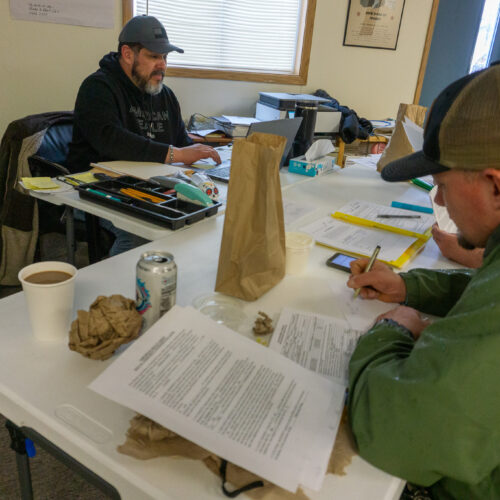
Christian nonprofit teaching sex ed at local public high schools

Listen
(Runtime 3:47)
Read
MOSCOW — A local Christian nonprofit started providing sexual education last week through guest lectures at Moscow High School.
WISH Medical was approved to provide a guest speaker at the high school May 16-24. WISH Medical is part of the nonprofit Palouse Care Network, which describes itself in its volunteer forms as an “outreach ministry of Jesus Christ.”
Shawn Tiegs, Moscow School District superintendent, said the curriculum for the lectures, which were opt-in and required parental permission, was vetted prior to approval by a group of administrators, teachers and parents, and that the curriculum does not contain religious materials.
“It is 100% not religious in nature,” he said. “I feel very confident saying that as a superintendent. The presentation itself, it’s fact-based. It has the same focus that the state of Idaho content standards have for sexual education.”
Idaho standards for sexual education require a focus, among other things, on abstinence, which the unit provides.
WISH Medical is an anti-abortion medical clinic that provides services, including sexually transmitted infections testing, pregnancy testing, ultrasounds and “abortion pill reversals.”
The American College of Obstetricians and Gynecologists does not support prescribing progesterone to stop a medication abortion, and states that so-called abortion reversal procedures are “unproven and unethical.”
However, Amy McNelly, Palouse Care Network’s chief executive officer, said the speaker also provides medically accurate information about things such as condom use.
“We address that if students choose to not be abstinent, kind of what risks there are, and what safer practices of sex are,” she said.
McNelly said the organization focuses on sharing medical information from sources such as the Centers for Disease Control and Prevention, the Cleveland Clinic, the Mayo Clinic and the American College of Obstetricians and Gynecologists.
The guest lectures cover units on personal values, including how students’ values are impacted by engaging in sex outside of marriage, definitions of sexual experiences, setting boundaries, healthy relationships, sexually transmitted diseases, and male and female anatomy.
The lectures also cover the “CARE plan” to talk to students about creating and reinforcing boundaries, McNelly said. CARE stands for communicating boundaries, avoiding dangerous situations, reinforcing boundaries and exiting a situation.
McNelly said although individuals may have personal religious convictions that shape their beliefs, the organization is careful not to promote specific religious beliefs.
“That is certainly something that we abide by and make really clear to schools,” she said.
Jade Stellmon said she opted in for her 14-year-old son Hamilton Stellmon, despite some reservations, because she also makes sure to educate her children at home.
She said she was encouraged to see the curriculum wasn’t religious but still had questions about why the organization was selected when there are other qualified professionals in the area.
“There’s an advanced practice nurse employed by the school district, who I think could be a great individual who could be part of this discussion.” she said. “There’s pediatricians and family medicine doctors and obstetricians who are really involved in our community. Our family works in health care, and we don’t know who any of these providers are.”
Sarah Quallen is the mother of Julius Quallen, a ninth grader set to take health class next semester. She said she’s skeptical about the group providing unbiased information.
“People like me aren’t necessarily going to trust that that’s accurate information or that it’s complete,” she said.
Her husband, Sean Quallen, said he doesn’t feel a public high school should be bringing in outside groups with a specific agenda, even if the information the speaker provides is accurate.
While parents for students enrolled in the class could opt out of the lectures, Sean said he feels most parents would operate under the assumption that guest speakers would not be coming from a religious organization at a public high school.
Neither one of the couple knew about the WISH Medical or what it was until recently.
“A lot of us are busy as parents. There’s an implicit trust that we want to give to the school system,” Sean Quallen said. “This feels like a breach of that trust, a little bit.”
Her son, Julius Quallen, said he wants to attend the class so he can ask questions, especially because it could be helpful to other classmates who haven’t had sex ed before.
“I’ve had a lot of friends that haven’t really been taught about things like that. One of my friends, she was only taught about her period the day she had it, and didn’t even know they existed beforehand,” Julius said. “So being able to know a lot more about that is actually quite nice.”
Tiegs, who is wrapping up his first year as Moscow superintendent, said he had heard of the high school having guest speakers from public health before his arrival but was unsure if any would be available at this point.
Hamilton Stellmon attended the first talk with his class Friday. He said the group talked about, among other things, some of the history of sex in different generations.
The lecturer, Sara Jennings, also encouraged monogamous, long-term relationships such as marriage, he said, and focused on how sex can affect emotional bonds and make it more difficult when a couple break up, as well as put people at risk for STIs, he said.
Jade Stellmon said she had a preference for sex ed more heavily focused on clinical facts and safety.
“I think there is absolutely an emotional component to sex that should be openly discussed,” she said. “The relationship aspect, to me, is not really a health component. I don’t know that it’s part of the school’s responsibility to teach what a goal is for their sexual relationships.”
Her daughter, 16-year-old Tk Sellmon, had sex ed through her health class two years ago and didn’t have any guest speakers. Tk Sellmon noted that, at the time, the class she took emphasized many of the same goals of monogamy and long-term partnership.
Curriculum director Carrie Brooks said Moscow High School reached out to WISH Medical about guest speaking after the current teacher for the health class heard about it from another area teacher.
Jennings is the designated educator at Palouse Care Network. McNelly said the organization provided similar guest talks with about seven other area schools, mostly in Idaho, but left it to the individual schools to disclose.
“We have an education presentation that we do in a number of local public schools and have been in several of those schools for over 15 years,” she said. “It ranges from a four- to six-day presentation and those classes.”
The majority of the sex ed portion of the class will be covered by the guest speaker, Brooks said, though the teacher will be present and overseeing the lecture.
Tiegs said parents were also provided the opportunity to review content prior to the lectures.
“We give an opportunity to opt out,” he said. “We allow for parental review of the content in the presentation and certainly just encourage the families and parents to be a part of it.”
McNelly said she welcomes any questions from parents who want to learn more about what’s being presented in the classroom.















